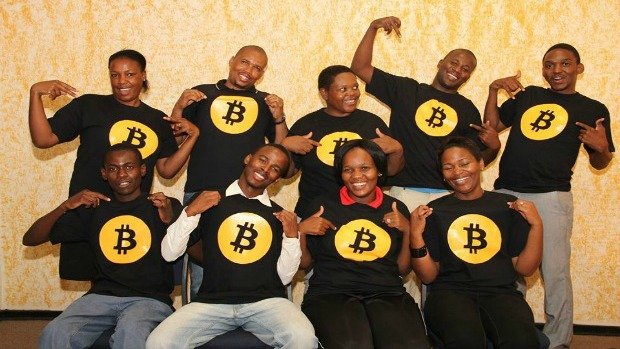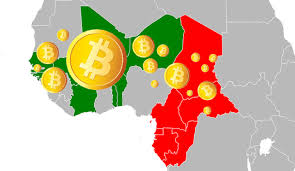Are African countries especially Nigeria adopting bitcoin talkless of altcoins despite Exchanges like Remittance, & others, reaching to Africa? Or waiting for government approval? Or is the government shielding it from public?
Decentralization is the new thing in town, Blockchain & Bitcoin are the latest trend in electronic payment and they seem to be gaining recognition all over the world except for Africa
Some African countries have openly criticized bitcoin use. Others have taken a wait-and-see approach.

But in Nigeria Despite a committee set up by the Central Bank of Nigeria (CBN) and the Nigeria Deposit Insurance Corporation (NDIC) to look into the possibility of the country adopting the technology driving Bitcoin and other digital currencies – blockchain – has submitted its report, several sub committees are still working on the issue, the Director, Banking & Payments System Department at the Apex Bank, Mr. ‘Dipo Fatokun, has said.
He disclosed this last weekend in Lagos.
Specifically, he said that the issue was not something the authorities would want to rush to take a decision on given that the technology is still relatively new.
Fatokun said: “The NDIC and CBN committee has concluded its work, (but) it is a new technology, it is not something we can rush.
“Some other sub committees are also working on it.”
Similarly, Managing Director, Nigeria Deposit Insurance Commission (NDIC), Alhaji Umaru Ibrahim, last weekend disclosed that the commission and the CBN had set up a committee to look into the possibility of legalising the use of the digital currency, the Bitcoin, for transactions.
After Japan in early April this year began accepting Bitcoin as legal currency, more countries have started considering the possibility of legalizing the cryptocurrency as a payment method.

Several e-commerce sites including South African online marketplace BidorBuy and the Nelson Mandela Children’s Fund now accept bitcoin. However, merchant adoption is still low.
Bitcoin regulation in Africa in 2017 will likely allow e-commerce sites like Konga and Jumia to openly show interest in the digital currency without appearing to go against their government’s attitude toward bitcoin, according to ITWeb
Unlike conventional currencies such as the naira, dollar, the euro, etc., Bitcoins are issued and managed without any central authority- no central bank, government, company, or commercial bank owning the process.
As such, it is more resistant to wild inflation, devaluation, import policies, currency fixing and corrupt banks. In addition, its proponents argue that it is a true floating currency whose value is determined by demand and supply. However, critics contend that the absence of a regulatory or central authority means that the chances of fraudsters using the process to launder money were very high.
Indeed, according to an industry source, due to the risks involved, the CBN is not likely to approve these cryptocurrencies.
The source said: “There are over 1,000 of such currencies globally, so, regulating how they are used for transactions will be a herculean task for central banks.”
It will be recalled that the NDIC boss told journalists at the 2016 Workshop for Financial Correspondents in Kaduna last December, that the Corporation and the CBN had constituted a committee to examine the advantages and disadvantages of adopting Bitcoin technology.
He said: “On our part, we have constituted a committee together with the central bank to have an in depth study of this phenomenal Bitcoin.
We will look at its advantages and disadvantages, what it means for the payment system and what it means for the safety and security of customers.
“We will also look at what it means for money laundering, anti-corruption, crime and measurement of money/near money instruments for the economy.
Nigeria and Zimbabwe ranked among the top 10 of 178 countries with the highest relative potential for Bitcoin adoption in 2014, according to London School of Economics author Garrick Hileman. They’ve kept these positions in 2016. However 2017 change things according bitcoin regulations, see below.
Uganda
The U.N. held its first roundtable discussion on policy, legal, ethical and socio-cultural issues around the regulation of virtual currencies in Uganda. The event was put on by UNAFRI – the U.N. African Institute for the Prevention of Crime and the Treatment of Offenders.
Uganda could be the first African country to regulate digital currencies, ITWeb reported.
Kenya.
Regulation in Uganda, if it happens, may encourage Kenya to follow suit. Kenya has struggled to legalize Bitcoin since 2015, despite it being home to some of Africa’s most enthusiastic users.
Bitcoin transactions in Kenya increased more than 10 times in 2016, according to LocalBitcoins, the world’s largest online bitcoin trading marketplace.
South Africa
South Africa has the highest bitcoin use in Africa. A South African Llew Claasen heads the Bitcoin Foundation which helps shape global perception of the currency, ITWeb reported.Claasen expects bitcoin adoption to grow in areas of savings, peer-to-peer payments and mobile PoS for informal vendors.
Zimbabwe
Bitcoin is a potential solution to address Zimbabwe’s on-going currency woes, said economist Philip Haslam, co-author of “When Money Destroys Nations.”
Zimbabwean bitcoin startup BitFinance announced in December a new investment from angel investor Taurai Chinyamakobvu, according to Zimbabwean tech news site Techzim.
Several bitcoin events were held there in 2016 and 2017 including the Coalition of Automated Legal Applications. Blockchain technology is meant for Africa, stakeholders concluded, such as Peter Todd, Bitcoin Core developer and Vitalik Buterin, lead developer at Ethereum.
There's a need for lot of education to do this and I’m calling on you (the media)nigerian people to educate yourselves about all of this so you can educate the public.”

